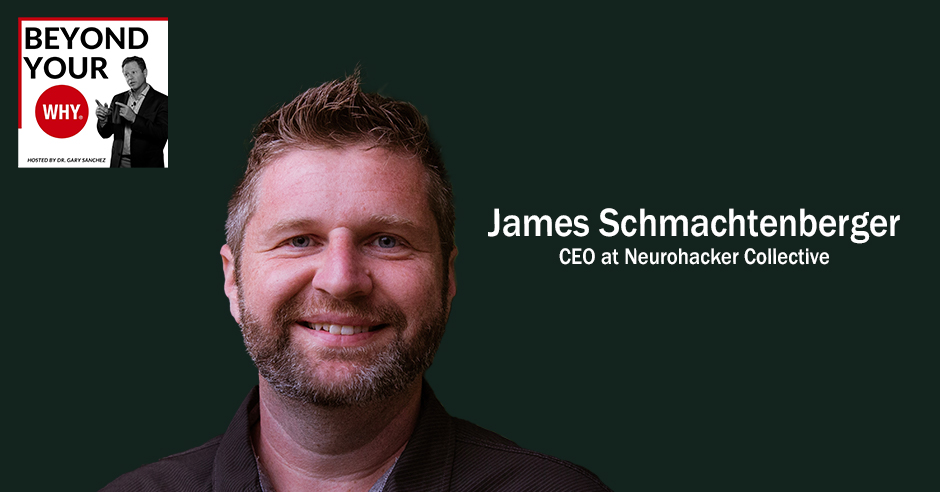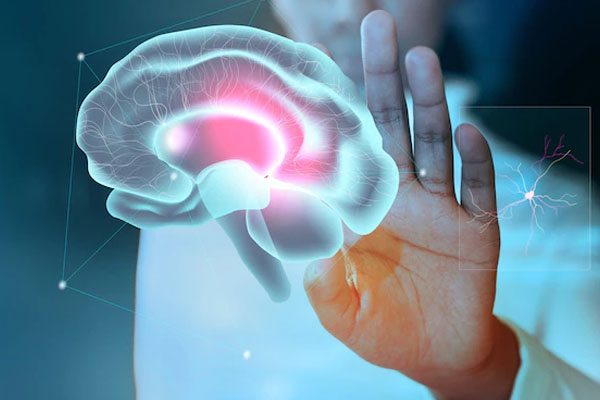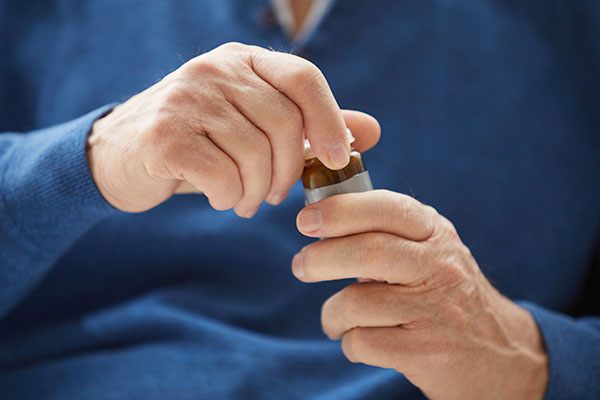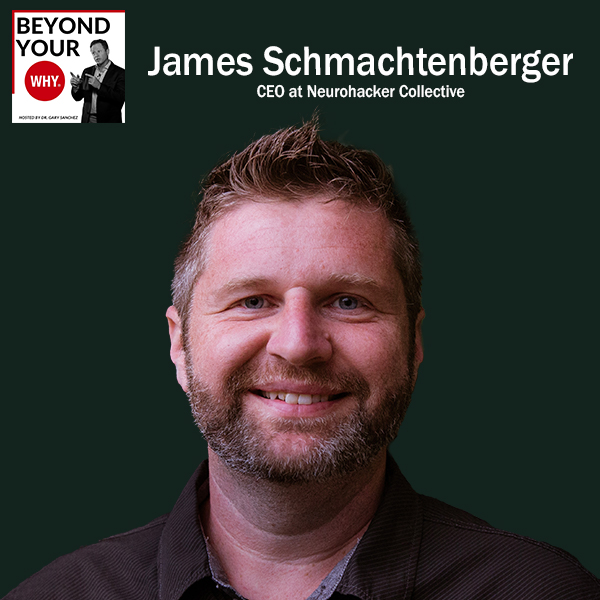
Are you constantly seeking better ways to do everything? Join today’s guest, James Schmachtenberger, as he demonstrates how he embodies the WHY of Better Way. Through a lot of scientific research, James, along with his company, Neurohacker, is constantly trying to enhance people’s quality of life. His supplements, like Qualia Mind, help people become more motivated and effective at what they’re doing in life. He wants everyone to become increasingly adaptive to their reality. For James, if you want to live a longer and happier life, you have to start at your foundation. Join Dr. Gary Sanchez as he talks to James Schmachtenberger about how he started Neurohacker. Learn how he was able to buy the college he studied in at 18. Discover how a monk led him to his journey of self-discovery. Find out how supplements work and how they affect your body as a whole. Start hacking your body to find enlightenment today!
—
Watch the episode here
Listen to the podcast here
WHY Of Better Way: Enhancing People’s Quality Of Life With James Schmactenberger
We’re going to be talking about the why of better way, to find a better way and share it. If this is your why, you are the ultimate innovator and are constantly seeking better ways to do everything. You find yourself wanting to improve virtually anything by finding a way to make it better. You also desire to share your improvements with the world. You constantly ask yourself questions like, “What if we tried this differently? What if we did this another way? How can we make this better?” You contribute to the world with better processes and systems while operating under the motto, “I’m often pleased but never satisfied.”
You are excellent at associating, which means you are adept at taking ideas or systems from one industry or discipline and applying them to another, always with the ultimate goal of improving something. In this episode, I’ve got a great example of that for you. His name is James Schmachtenberger.
He is a successful serial entrepreneur with a lifelong focus on using business and innovation to affect large-scale change for the benefit of humanity. James is the Cofounder and the CEO of Neurohacker Collective, a company focused on making groundbreaking products for health and well-being through complex systems science. His area of expertise includes new nootropics, anti-aging, regenerative medicine, sleep, and fast-acting, fast-paced entrepreneurialism. James, welcome to the show.
Thank you. It’s great to be here.
This is going to be fun. Tell everybody where you’re at now.
I’m San Diego based, at least most of the time. I travel a decent amount, but always nice to be home, which, fortunately, I am now.
You and I connected through an event that I was speaking at with JJ Virgin. I heard about your products. I use your products but didn’t know from that bio that they were your products. What is the most famous product you have created that people might know about?
Our flagship product is one called Qualia Mind. It’s a broad spectrum cognitive enhancement designed to do a lot of the things that people traditionally look for when they go towards cognitive enhancement and improvements in focus and memory, but we take it many steps past that. We are working on those things. The goal was how you increase all forms of intelligence in a sustainable and holistic fashion. In addition to things like focus and memory, we’re looking at things like critical thinking skills, improving discernment, decision-making, better visual reasoning, etc.
It’s pretty much the whole gamut. Part of optimal cognitive function is also your state, how good you feel about yourself, and your outlook on the world. In addition to trying to enhance brain function, it’s also working to enhance mood and outlook so that not only do you have more intelligence but more drive and capacity to pair with that enhanced intelligence.
I want to dive into that. I’m sure that’s fascinating to everybody who’s reading. Before we do that, let’s go back a little bit. Let’s go back to your life. Where did you grow up? What were you like in high school?
The majority of my life has been in California. My family moved here when I was nine. I’m originally from Iowa. I didn’t do high school. I was homeschooled off and on throughout the younger part of my life. My parents did want my brother and me to experience traditional school for a few years. We had social interaction, but also a connection in the sense of what everyone’s experience is. A lot of early life was homeschool. I ended up skipping over the high school experience. My last time in school was in seventh grade, and then I essentially took a year off to watch TV.
Hold on. What was that you said?
My last time in school was in seventh grade. After that, I was supposed to go back into homeschool. I just became disinterested. I was working with a tutor at the time and didn’t relate to the style. I essentially slacked off and spent most of the year watching television. From there, I ended up essentially faking a diploma to be able to start going to college, much younger than normal. I ended up hopping into community college at fifteen and did a couple of years of college before realizing that that wasn’t my orientation. I loved learning and studying, but I didn’t love the traditional structure of studying.
Depending on the topic, it was either too fast or too slow, but also generally not that interesting. I was more of an immersive learner. After a couple of years, I stepped out of college. My family always jokes because right after I went out of traditional college, I started in a vocational college studying Psychology and Alternative Medicine. About a year into that, as I was graduating, there ended up being an opportunity to buy that school. Shortly after my eighteenth birthday, I raised some money, bought out the college I was graduating from and spent most of the next decade running that. It was a bit of an abnormal life experience.
I don’t know many people that buy a college at eighteen.
I don’t recommend it. It was spectacular for me in many ways but also terrifying and daunting. I barely knew how to balance a checkbook. All of a sudden, I was responsible for tons of employees and hundreds of students.
What was that like for you?
It was spectacular and devastating all at once, especially in the early years, because I genuinely didn’t know what I was doing. I was so in love with what I had learned and what I saw as the bigger implications for the world of more people learning to live healthier lives and going into some of the domains of psychology and personal development. There was this huge mission and passion attached to it, but at the same time, I felt like I was failing. During that first three years, I made up for my lack of knowledge with work hours. I was working twenty-plus hours a day and mostly never went home. I would take a nap under my desk and get back to work. If I did take time off work, it was usually to go to a business workshop or marketing workshop and learn what I was doing.
It was this weird thing. I was in love with it, and I was also burning out. By the time I hit 21, I was in full-stage burnout, starting to have adrenal failure and all kinds of cognitive issues. I started feeling depressed, which made me start having an existential crisis because here I am doing this thing I love, and I was depressed and couldn’t make sense of it. It was an interesting experience. It’s ultimately a beautiful one, just a little harder than it needed to be.
What did your family think when you said, “I’m going to buy this college?” Did you even graduate from college?
I was finishing my last courses when I ended up taking over the school. I finished 2 or 3 months after I owned the school, which also created a weird dynamic of being the owner of it and still being in class. I loved the nature of the work, so I continued to study it a lot. After I bought it, I spent about five years in an intensive, one-on-one or small group studying with the man who founded the school and went progressively deeper, particularly into the psychology and personal development domains.
If I’m reading this now, I would be wanting to ask the question, “Why would the founder of the school sell it to an eighteen-year-old kid who hasn’t even graduated yet?”
That was a very common question. He got a lot of flak for making that decision. I had known him for a number of years, not particularly well before starting school, but I met him when I was ten. I was so passionate about the work that I dove in a way that not many people did. It was supposed to be a two-year program, and I ended up doing it in a year. Part of it was probably that he had been doing it for twenty-plus years and wanted to slow down. He still wanted to teach but didn’t want to run the business. Part of it was he saw something in me that he was willing to gamble on. Luckily, it worked out. In retrospect, I would’ve been one of those people being like, “What are you doing? This is insane.”
At this stage of your life, if you were advising the person that founded the college, would you advise them to sell it to an eighteen-year-old who hadn’t graduated?
Probably not. It was an interesting experience. I remember when I was going through the process, my dad had a quote that I thought was funny. He’s like, “You’re just naive enough not to realize what you can’t do.”
[bctt tweet=”When you’re young, you’re just naive enough not to realize what you can’t do.” username=”whyinstitute”]
I can see that. Now you’re the young adult burned out, depressed owner of a college to help people not get burned out and depressed. How did that go now? Where did you go from there?
That ended up being a big turning point in my life and ended up being where the inspiration for Neurohacker, the company I run now eventually where it initiated. When I was 21, I was fully burnout with lots of health issues and psychological issues. I started down my healing journey. There were all kinds of things I was doing. I ended up getting introduced to this research physician in Mexico that had developed this specialized IV therapy for helping people repair all kinds of cognitive damage. Most of his work was for people recovering from drug addiction. When I met with him, he was like, “What you’ve done to your brain not sleeping for three years is equivalent to a heroin addict.” I went and did three days of this IV for nine hours a day. It completely changed my world.
It wasn’t like a subtle improvement. It was like the lights came back on. The cognitive function I had lost not only came back, but I had an awareness of whole new aspects of cognition that I hadn’t tapped into before. The depressive experience went away and was replaced with a sense of confidence and motivation. The piece that stood out to me was my empathy shot through the roof. All of a sudden, I stopped being able to think about what I wanted to do in the world without automatically being aware of what the bigger implications of that were and how those actions would affect the people around me in the world at large.
It was the reflection on that experience that told me this was the direction I wanted to go. Let’s say hundreds of thousands or millions of people could have this experience where they became more intelligent, more confident, more capable and more empathetic. They had an intrinsic motivation to use their competency and their intelligence for not only personal gain but for greater purposes. That could be something that could move the needle and change the world. That ended up being the original inspiration. Back then, I tried to partner with that doctor and was going to try to open up IV clinics all over the world.
We started down that process, but very quickly into it, he ended up becoming quite ill and passed away. Most of his research went away with him. There was this beautiful vision and no longer a path. It took a number of years while I was running other businesses, continuing to study this in the background, meeting with neuroscientists, formulators, and neurobiologists to start to get enough of the ideas and information together to be able to still create that vision but through a totally different modality.
What was in the IVs that you got in Mexico? Do you know?
I partially know. The key ingredient in it was NAD, which at this point is gaining significant popularity. NAD is a molecule naturally produced in the body that is the primary energy source for all cells. When you get increased NAD, essentially, health across the board starts to increase because your cellular health begins to increase. It also has significant benefits on cognitive function and clarity. That was the key ingredient. There was a series of different amino acids to be able to lever up what the NAD did on its own. I still don’t know entirely what was in it because no one does other than him. Over the years, I was able to put the pieces together and recreate enough of it to understand what was happening there.

In fact, at that event, I met your team. There were a lot of people talking about psychedelics. Was any of that that in there, do you think?
I’ve had some people who also went through his work that theorize that one of the ingredients was GHB, which is an increasingly popular psychedelic. It hasn’t had as much attention as things like psilocybin or LSD but is starting to gain more attention. It’s a prescription drug used for sleep disorders but in different applications and a higher dose creates psychedelic experiences and puts people into very open and receptive states, which gives the opportunity to go into areas of your psychology or work on things that might not feel safe in a normal fashion. Being able to explore them in that state makes it much more accessible. I wouldn’t know for sure if that was in it. I tend to think it was.
You go down to Mexico and have this IV therapy. It increases your empathy and energy. It gives you more intelligence and competence. You start to come back to yourself. Did you come back to yourself or a better self?
Both. I was still myself. It wasn’t like there was a fundamental change in my personality and my sense of self. It was an improved version. I felt a lot better about who I was. I felt the things that had always driven me, and all of a sudden, I had more ability to apply them in the world. It was still me. It was just an easier version of life through the experience of being me.
You then decided, “I want to get into this. I want to figure out how to do this.” You start down the path of creating IV clinics. That ended. What then happened to you?
We didn’t end up starting to officially work on Neurohacker for a number of years still. The R&D process formally started in 2014 and had a psychedelic component. During the years in between, I was doing a number of other projects. I ran that college for almost ten years and ended up selling it in 2010. At that point, I got into the medical cannabis industry in the very infancy of that space. I did quite a lot of business there, but I also got heavily involved in the public education side and, eventually, the policy side. For probably seven years or so, I ended up running a lot of the legalization campaigns and was building cannabis businesses, in essence, to be able to fund a lot of the clinical work and the public education work.
During this time, while I was running those businesses, I was continuing to study a lot of this domain. I don’t have a deep formal science background. I was never in a position to be able to build the thing adequately myself. I needed people. I had the vision, just not necessarily the know-how. In 2014, I went to Burning Man, and Burning Man tends to fall over my birthday this 2022. I decided on my birthday to take acid and wander out in the desert by myself and essentially do this vision quest to figure out what I wanted to devote the next many years of my life to.
What ended up coming through powerfully was this vision that you’ve had forever is too important not to create. However hard it is or whatever it takes, it has to happen. On the drive home from Burning Man, I had gone there with my brother and started a conversation with him. I was telling him about this experience. Even though he had known what I wanted to do for a long time, he didn’t quite get the bigger implications of not just the positive effects on the individual but the potential effects on humanity at large. As he started to understand that, he was like, “I’ll partner with you.”
My brother’s background is in complex system science. He’s a brilliant scientist and researcher. It was his ability to bring that complex systems approach applied to the study of human physiology that all of a sudden made the idea real. We spent about two years after that in this heavy R&D phase, developing the scientific model around complex system science and developing our first product, which is now Qualia Mind. From there, it turned into a company and started bringing its market in late 2016.
It’s a long journey but fascinating. I’m glad we went back because now what you’re doing makes more sense and why I should listen to you makes more sense. In your industry, how many hackers without the bio are there out there? How many fake stuff is out on the market?
Unfortunately, the majority of it. There are some really good companies out there. There are a lot of companies I respect, but when I look broadly at all of the cognitive products being marketed, they have very little science behind them. There’s a lot of marketing hype. I see these ads all the time like, “This is the pill that Warren Buffet takes to make all of his money.” Warren Buffet’s never even heard of the thing. It’s completely made up. You look at the ingredients, and you’re like, “That’s nice.” It might do a tiny bit of something over the duration of many months, but it’s not going to be a real impact. There are only a few companies that seem to devote themselves to research in an adequate fashion.
That’s been the area in that we’ve invested incredibly heavily. We’re not even that big of a company. There are supplement companies that are many times our size that still don’t have nearly as much invested in R&D. We have, at this point, a six-person in-house R&D team, plus a 30-person scientific advisory board outside of that, going on 30 studies at this point. The goal is not just how you make a profitable company. That’s wildly easier. The goal is how we advance the field of research and bring progressively better products, better science, and better education to people in a scalable fashion that are both effective and safe. Usually, you have safe but not all that effective or effective but not all that safe. Hitting both of those simultaneously does require substantial research.
[bctt tweet=”You can be safe but not effective or effective but not safe. If you want to hit both, you need substantial research.” username=”whyinstitute”]
Before we started, for those reading, I told James that in the building that my office is at, there is a place called the Optimum Human. They only have the best of everything there. The guy that started it is Matt Finkelstein. His why is better way as well, but he’s like us on steroids. Maybe not like you on steroids because you’re pretty much right there with him. He flipped the words from better way to way better.
Everything he touches has to be way better. He has Qualia Mind there. That’s where the interest was for me in talking with you about this because I didn’t know much about it. I used it and liked it. I couldn’t tell you this story that we’re getting now. I couldn’t tell you anything about the company other than if it’s up there, it’s probably good enough for me. This has been helpful in figuring that out. Let’s get to your first big product, which was Qualia Mind. If you haven’t heard of it, take a look at it online. What does it do? What is Qualia Mind all about?
Because of the scientific approach we’ve taken, it’s an interesting thing. Most products on the market, if they are effective, they’re trying to typically increase one or more neurotransmitters. In our case, we’re not trying to do that. The nature of our product is designed to bring the system into balance or homeostasis and increase capacity from there. The idea is there are times when you need more of a certain neurotransmitter or times when you need less. What we want is to be able to create the formulas that allow your body to do that in real-time, so you become increasingly adaptive to reality.
Before we go there, why don’t you clarify for everybody what a Neurohacker is?
A Neurohacker is a term we came up with. In essence, it’s the intentional use of various forms of chemistry or technology to enhance neurology or your brain function. In our case, we’re more focused on the chemistry side, but there are all kinds of technologies as well. There are things like neurostimulation and transcranial magnetic stimulation. Essentially, rather than living life as a standard, it’s choosing to study and invest in what are the key things out there that can make meaningful improvements in the shortest amount of time possible within a reasonable safety profile.

Essentially, we want to find a way to make our brains work better and how we can hack the system to create a better life through enhanced brain function. That led you to Qualia Mind, which does that. If I take Qualia Mind, in layman’s terms, what is that going to do for me?
Most people have a positive experience within the first day or two. Usually, what you start to notice right away is reductions in procrastination. The things that have been sitting on your desk for way too long, all of a sudden, you feel motivated to do them. There are also improvements in processing speed, how much information you can digest and make sense of, and how quickly you can do that. There are improvements in memory, both short-term and long-term. One of the key areas is working memory on how much information you can hold in real-time at a given moment. Those things all generally start to take place within very short order and become progressively more so over the course of a few weeks.

Some of the things like memory take a little bit of time for the nutrition to work inside your system before you get the full benefit, but you usually start to notice some of those changes right out of the gate. There are also key changes in mood and outlook. Almost everyone who takes the product starts noticing that they become more present. That’s one of the pieces I enjoy hearing about the most. I love hearing people being smarter, intelligent, and effective, but when people write in testimonials that all of a sudden they’re more present with their family and more in tune with their children and their relationship and see improvements in their meditation practice, these things are the things that tend to excite me the most.
How is Qualia Mind different than taking a handful of vitamins? You see these different vitamin packs that promise the world. How is it different than your typical vitamins?
Substantially. We include a number of vitamins because there are key vitamins that the brain needs to be able to operate even just functionally but particularly optimally. Most people don’t get enough vitamins in their diet. There are things there, but there are all kinds of minerals. There are many types of amino acids and botanical extracts. Each one is designed to be able to support different aspects of brain function. Some of them are being able to support better production of dopamine, serotonin, and acetylcholine and to do those in multiple fashions because everyone’s physiology is so different. If you use a single ingredient or single approach, what ends up happening is something will work well for one person but won’t necessarily work well for somebody else.
The nature of how we’ve designed is we’re usually using multiple ingredients for each use case. As a result, it’s being able to get meaningfully positive effects across almost everyone. When we’ve done surveys around it, we see about 92% of people who take the product notice a meaningfully positive result. If you look at supplements in general, from the stats I’ve seen, it’s usually about a 15% positive response rate. If you take a good multivitamin for the brain, about 15% of people will probably have a good effect on that. The way that we’ve approached it with this much more complex orientation allows for a higher degree of effect but also affects a much larger population.
I have a friend who has one of the larger vitamin company essentially. I asked him. I said, “What percentage of health fitness would you attribute to taking the right vitamins?” He said less than 4%. What you are talking about is something totally different than that. What you’re talking about is the mind versus the body.
For this particular product, yes. We have other products that address different parts of the body at this point. I don’t disagree with him in general. I would orient it at a higher percentage than that. One of the things where people get off paths sometimes is they’ll find a great supplement and be like, “I’m going to do this, but it’s the only thing I’m going to do.” That doesn’t work. Supplements, based on their name, they’re designed to be supplemental.
This is on top of a healthy lifestyle. If you’re not getting good quality sleep or enough of it, if you don’t have a good diet and you take supplements, it will help somewhat, but it’s not going to help nearly as much as if you’re doing all the baseline things that we all know to be doing, just maybe aren’t. When you are doing those things and taking the right supplements on top of it, that’s when you start to get the exponential benefits that kick in.
You said what I was trying to say, but much better. That’s what I meant. If you don’t follow all the other things and just take a supplement, it’s not going to do much for you. It’s that last little thing that will get you to another level, but only if you’re doing the rest. What you’re talking about is not necessarily related to that. What you’re talking about gets your brain functioning better so that you want to do those other things so that you have a better outlook, you are more present, and your brain processes faster.
What you said there is a key piece, and it was for me personally. When I hit such a degree of burnout, I knew I should be exercising more. I knew I should be sleeping better. I just couldn’t. I didn’t have the energy and wherewithal to make it happen. Starting to get into nootropics and eventually into our product gave me the energy and motivation to be able to start doing all of the other lifestyle factors. It goes both ways because you get an increased benefit when you’re doing the right supplements on top of everything. If you also know you’re supposed to be doing it, and you can’t get there, sometimes the right supplements can help you get over that edge and be able to take the right actions, then move everything in the better direction.
Now you’ve developed Qualia Mind. What took place after that? I know you’ve got other products because I have one. What are the other products? What was the reason for developing these other and going in these other directions?
Once we developed Qualia Mind and started seeing these remarkable types of effects with people, what became clear was that that same model of science we developed. This complex systems approach could be applied to almost any aspect of physiology and allow for creating meaningful products for addressing almost everything. We take this foundational approach. Getting people’s brains to function in order seems necessary for everything. From there, we said, “What comes next?” That ended up being, “Let’s focus on cell health.” That puts it in the domain of longevity. Increasing life expectancy is great. It’s something that we are trying to and achieving.
[bctt tweet=”Increasing life expectancy is great, but improving health as a whole is more important.” username=”whyinstitute”]
More important than that is how we improve health as a whole and make sure that the years you are on the planet are as healthy and vibrant as possible. One of the key ways to do that is to go foundational and make your cells work better. We ended up developing a product called Qualia Life. It’s a mitochondrial formula that is designed to increase the amount of energy that your cells can output and increase cellular metabolism.
As a result of these things, your cells start to work better, which means all of your tissues start to work better, which means essentially all of your health begins to improve in meaningful ways. This particular product does focus to a significant extent on NAD, which we talked about a little bit earlier. It’s not only focused there. There are many pathways that we’re touching on. NAD is one of the key ones and one of the few areas we’ve had the opportunity to study so far and saw remarkable increases in the amount of NAD levels in people’s blood.
We went from cognition to longevity. We’re still continuing to build products in the longevity space. We released a product called Qualia Senolytic, which most people don’t know what senolytic is. It’s essentially a compound that gets rid of senescent cells, which are also referred to as zombie cells. When cells are healthier, they are supposed to be able to continue to divide and replicate. When they lose that ability, they’re supposed to die off.
As we age, and particularly as our immune system stops working as well, a lot of times, what happens is cells lose that ability to continue to replicate, but they don’t die off. They sit there and take up resources that could be going into healthy cells. Even worse, they emit these chemicals that turn the rest of the cells around them senescent, and it speeds up the whole aging process.
One of our products is being able to help those senescent cells clear out in the system and allow all of the resources to go into healthy cells, supporting better aging across the board. We’ve continued in the longevity space. We’ve gone into a number of other areas. We have a product for being able to support the improved vision. We have products for increasing energy. We’re getting ready to launch a product for improving gut health both at the level of the gut with a cognitive focus. As most people don’t necessarily know, the majority of your neurotransmitters are produced in the gut. When gut health becomes off, not only do you have whatever digestive issues that might come from that, but it has a serious impact on mood and brain function. That product will be coming out soon.
As another better way guy talking to a better way guy because that’s my why as well, what do you think is going through my mind now when I start to hear about all these products? From my perspective and a consumer’s perspective, what I want is one thing. I don’t want ten or a handful. I want one thing that’s going to give me the biggest bang for my buck. If the readers are reading and they say, “That all sounds great, but I want to try it, and I want one thing. What is the one I should start with?”
I agree with you. Ideally, there would be one product. The inherent challenge there is it would be a very expensive product and a lot of volume of capsules to take. If you look at the things we’re doing, and you’re going to pick one, I’m going to break your rule, and I am going to give two. It depends on what your need is. Qualia Mind would be a key one. If the need is to be more motivated, have more intelligence, and be able to be more effective at what you’re doing in life, Qualia Mind would be that one.
It’s not just a cognitive product. It has benefits across all kinds of things, but it focuses there. If your primary goal is improved physical health, longevity, and improved recovery energy, I would say Qualia Life. Those are probably my two favorite products. I take all of them, but those are the ones I’m religious about because the effects are so significant that it doesn’t make sense not to. If you’re picking one, it’s one of those two depending on what the need is.
One of the challenges the supplement has, which I don’t think you have, is I take a handful of stuff and don’t feel anything. I don’t know if I take it or don’t take it. I don’t notice any difference. With your products, you notice a difference. You feel different, and your mind is different. It gives you the motivation to take them. There’s not much motivation to spend $100 a month taking a handful of vitamins, and I don’t notice a thing other than very expensive urine.
It’s hard to go on faith with something like that. If you understand the science behind it, and it’s not just faith, there are some of those things that should be done, but if you can have a noticeable benefit, not only is it a better experience of life, but it becomes much easier to make it a consistent practice. That’s part of why we invest so much in research. We don’t want to create things you have to go on faith with. You want to have a real experience and know that things are getting better, and be able to feel those changes in your body, brain, and mood.
Why the name Qualia?
Qualia is a term from philosophy. Most people aren’t familiar with it. What it essentially means is your subjective experience of self and life. How do you perceive yourself? How do you feel about yourself? How do you feel about the world? The reason that we chose the word qualia is our aim was to enhance or upgrade that subjective experience. It’s a little nerdy, but it has a deeper meaning behind it.

It has a meaning which is important. Instead of just a cool word, it has some meaning. For those of you that are reading, James’ why is to find a better way, and how he does that is by making things simple and easy to use. What he ultimately brings is a trusting relationship where people can count on him. Things have to be better, simple, and create a better relationship or are trustworthy. That’s super helpful to know because you take things and simplify them. Isn’t that the essence of what you’re doing?
Yes. I don’t do it on my own. What I do is find the best experts in the world doing the most complex, interesting things and figure out how to work with them to take that complex, innovative, hard-to-access thing and make it accessible and simpler. I tend to serve that intermediary role between what is cutting-edge and impactful and how we make it something people can access.
Here’s the last question. It can be unrelated or related. What’s the best piece of advice you’ve ever received or given?
One of my favorite quotes comes to mind there, which is, “Don’t ask what the world needs. Ask what makes you come alive and do that. What the world needs is people who have come alive.” That particular one, when I heard it, stood out to me because I’ve always been someone who had a very strong drive to try to improve the world and the quality of life. For most of my life, the way I did that didn’t make me come alive.
[bctt tweet=”Don’t ask what the world needs. Ask what makes you come alive and do that. Because what the world needs is people who have come alive.” username=”whyinstitute”]
It tapped into that sense of purpose in a beautiful way, but I was running myself into the ground. It was an upgrade in the way that I was holding an earlier understanding of how to be, which was how you live your purpose but in a way that enhances and makes your own quality of life extraordinary. By doing that, you inevitably have more energy and passion for delivering on the goal. It took me a long time to learn that, and in many ways, I still am.
Can you say that again?
Don’t ask what the world needs. Ask what makes you come alive, for what the world needs are more people who have come alive.
I love that. That was good. I totally agree with you, but I’d never heard it put that way. That was awesome. James, if people want to learn more about you, your company, and your products, what’s the best way for them to get in touch with you or your company?
In either case, the best way is to go to Neurohacker.com. That’s where you can find information about all the products, our research, the education, and the best and easiest way to connect with me personally.
James, thank you so much for taking the time to be here. That was super fascinating. I’m going to run up after we’re done and get both of those. I’m going to get the Qualia Mind and the Qualia Life. Thanks for sharing.
Thank you. I enjoyed this. It was a great interview. I appreciate you having me on.
Thank you.
—
Thank you so much for reading. If you have not yet discovered your why, you can do so at WhyInstitute.com with the code Podcast 50. You’ll get it at half price. If you love the show, please don’t forget to subscribe and leave us a review and rating on whatever platform you are using because it does help to get the word out and help us impact a billion lives in the next fifteen years. Thank you so much for reading. I will see you next episode.
Important Links
- Neurohacker Collective
- Qualia Mind
- Qualia Life
- Qualia Senolytic
- https://www.Instagram.com/neurohacker/
- https://www.Linkedin.com/company/neurohacker-collective/
About James Schmachtenberger
 James Schmachtenberger is a successful serial entrepreneur, with a lifelong focus on using business and innovation to effect large-scale change for the benefit of humanity. James is the co-founder and the CEO of Neurohacker Collective, a company focused on making groundbreaking products for health and well-being through complex systems science. His areas of expertise include nootropics, anti-aging and regenerative medicine, sleep and fast-paced entrepreneurialism.
James Schmachtenberger is a successful serial entrepreneur, with a lifelong focus on using business and innovation to effect large-scale change for the benefit of humanity. James is the co-founder and the CEO of Neurohacker Collective, a company focused on making groundbreaking products for health and well-being through complex systems science. His areas of expertise include nootropics, anti-aging and regenerative medicine, sleep and fast-paced entrepreneurialism.

